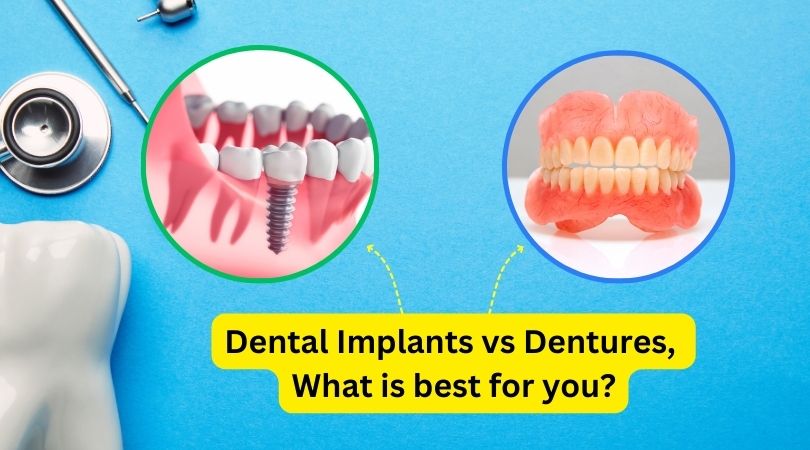
At Teeth Care Multispeciality Dental Clinic, we understand the importance of dental health in ensuring a confident and healthy life. Your oral health plays a vital role in your overall well-being, impacting everything from your ability to eat and speak comfortably to your self-esteem. In this blog, we'll delve into a critical decision many people face when it comes to restoring their smiles: Dental implants vs. dentures.
We aim to provide you with comprehensive information to help you make an informed choice regarding your dental health. Let's explore these two popular options and find out which one might be the best for you.
Dental implants are a revolutionary solution for replacing missing teeth. They are artificial tooth roots made of titanium, which are surgically placed in the jawbone. On top of the implant, a connector known as an abutment is attached, which holds the artificial tooth or crown in place.
Dental implants come with numerous benefits:
While dental implants are an excellent choice for many, not everyone is an ideal candidate. Eligibility for dental implants depends on factors such as bone density, overall health, and lifestyle. If you're considering dental implants, consult with our expert dental team. We'll evaluate your specific situation and guide you through the process.
Dentures are removable oral appliances designed to replace missing teeth and restore oral function and aesthetics. They consist of artificial teeth set in a gum-colored acrylic or plastic base. Dentures are customized to fit the individual's mouth, providing a natural appearance and allowing for improved speech and chewing abilities. While they are a cost-effective solution, dentures do require maintenance, adjustments, and daily cleaning to ensure their longevity and comfort.
Dentures are the traditional choice for replacing missing teeth. They come in two main types:
Dentures have their own set of advantages:
However, dentures do have some limitations, including:
The cost of dental implants is typically higher than that of dentures. However, it's important to consider the long-term costs and the potential for savings due to the durability of dental implants. Our clinic provides information on insurance and financing options to make the process more affordable for you.
The natural look and feel of dental implants often outweigh the aesthetics and comfort of dentures. A confident smile is priceless, and dental implants provide that.
Dental implants promote better oral health by preserving the jawbone. In contrast, dentures may lead to bone loss and associated oral health issues. Furthermore, dental implants offer superior bite force and chewing efficiency.
Maintaining dental implants is relatively easy, and they can last a lifetime with proper care. Dentures, on the other hand, require periodic adjustments, repairs, and replacement.
The decision between dental implants and dentures should take into account personal factors such as age, overall health, and lifestyle. Your preferences and priorities also play a role in making the right choice.
The importance of seeking professional guidance cannot be overstated. Our expert team at Teeth Care Multispeciality Dental Clinic is here to help. We have the experience and knowledge to evaluate your individual situation and recommend the most suitable solution for your specific needs.
The choice between dental implants and dentures is a personal one. It depends on your unique circumstances, preferences, and priorities. Both options have their merits, and at Teeth Care Multispeciality Dental Clinic, we are here to guide you through the decision-making process.
Remember, the most important step is to consult with a professional. We encourage you to contact our clinic for expert advice and a personalized evaluation. Your smile and oral health are worth the investment in time and consideration.
Dental implants are known for their durability and longevity. With proper care, they can last a lifetime. It's essential to maintain good oral hygiene and attend regular check-ups to ensure their long-term success.
Not everyone is automatically eligible for dental implants. Your eligibility depends on factors like overall health, bone density, and lifestyle. A consultation with a dentist is essential to determine if you are a suitable candidate.
Dental implants offer several advantages, including a natural look and feel, long-term durability, and improved oral health. They also provide better chewing efficiency and stability compared to dentures.
Dentures are generally more budget-friendly initially. However, it's essential to consider the long-term costs, including maintenance, adjustments, and replacements. Dental implants can be cost-effective in the long run due to their longevity.
The choice between dental implants and dentures depends on your personal factors, such as age, overall health, and lifestyle. A consultation with a dentist is crucial to make an informed decision based on your unique needs.
Yes, one of the primary benefits of dental implants is that they closely mimic the appearance and function of natural teeth. They provide a natural-looking smile and feel comfortable when eating and speaking.
Dental implant surgery is generally not painful as it is performed under local anesthesia, and patients often report minimal discomfort during and after the procedure. The recovery process is generally well-tolerated.
Yes, dental implants provide excellent stability, allowing you to eat a wide range of foods without restrictions. They restore your ability to enjoy a diverse diet and chew with ease.
Dental implants require regular brushing, flossing, and professional check-ups, just like natural teeth. Dentures need daily cleaning and periodic adjustments. Your dentist will provide specific care instructions.